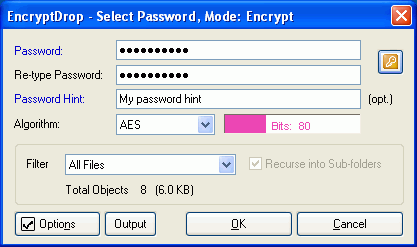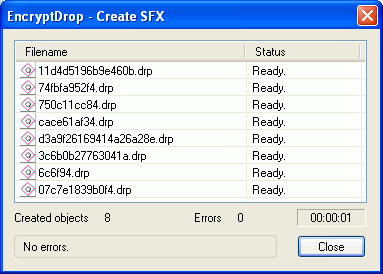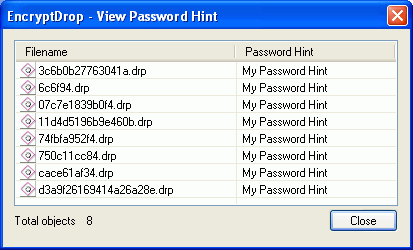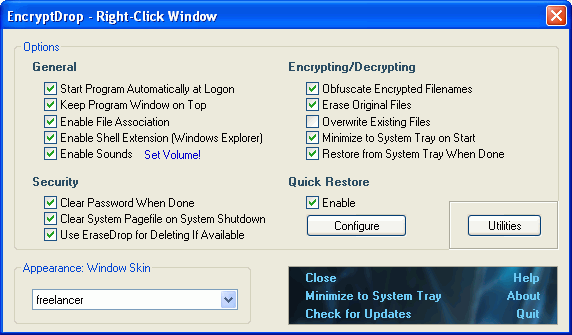
1.1) How do I stay updated?
1.2) What is Warp5 Technology?
1.3) I have a question/suggestion/comment. How can I contact the technical support?
2.1) I have encrypted my files, now how do decrypt them?
2.2) I forgot my password! Can you help me?
2.3) Why are some of the Right-Click Window items disabled?
2.4) What encryption algorithm does EncryptDrop use?
2.5) How long of a password can I use?
2.6) Can I somehow prevent subfolders from being encrypted/decrypted?
2.7) How do I create a self-extracting file?
2.8) Can EncryptDrop clear the system pagefile?
2.9) How do I make sure sensitive data won't get paged in system pagefile?
2.10) Can I create custom skins for EncryptDrop?
2.11) I want to limit the process to encrypted/non-encrypted files only. How do I do that?
2.12) How can I view the password hints of my encrypted files?
2.13) Can I copy EncryptDrop to a new system without having to run the setup?
2.14) Why do the custom skins seem to be missing colors?
2.15) I burned my encrypted files on a CD, how do I decrypt them?
2.16) How do I use the Folder Bookmarks?
2.17) Is there a way to view the last created log again?
2.18) I'm having difficulties to update/reinstall EncryptDrop, what can I do?
2.19) Can I somehow view an encrypted file's stored filename?
A: Open the Right-Click Window and click "Check for Updates".
A: Warp5 is the 5th generation encryption engine developed by Righteous Technologies. It is used by our EncryptDrop products.
A: Please see technical support for details.
Just drop the encrypted files into the program window the same way you did when you encrypted them. Enter the password, check your options and click OK.
See also Tutorials.
A: No, sorry. The only password information that is stored to encrypted files is the password hash value. We recommend that you start using password hints.
A: Some of the items such as the "Clear System Pagefile on System Shutdown" option requires system admin-rights.
A: You may choose from the AES, Twofish, CAST-256 and Serpent algorithms.
If you are more interested in these algorithms, please have a look at www.brainyencyclopedia.com.
A: 1-32 characters (8-256 bits).
A: Yes. Uncheck the "Recurse into sub-folders" box in the select password window.

A: You may create an SFX of an already encrypted file. There are two ways to do this.
1) Use the Windows Explorer shell extension. Make sure the extension is installed (Right-Click Window / Enable Shell Extension), then locate the encrypted file and right-click it. This opens the shell extension context menu from which select "Create SFX". You can do this also with multiple files.

Or:
2) Open the Right-Click Window, click "Utilities" and then click "Create SFX". To create a batch of SFX files at a time, please use the shell extension instead.

Please note that the SFX files will only run on Windows 2000/XP/2003 systems.
A: No, but Windows 2000/XP/2003 systems can clear pagefile on clean system shutdown (power off). You can use EncryptDrop to change this behaviour. Check "Clear System PageFile on System Shutdown" in the Right-Click Window.

Please note on systems with large amounts of memory, and therefore large pagefile, this tweak could cause a delay at shutdown due to the additional time taken to clear the data from the file.
NOTE: Login as an administrator change this option.
A: Enable AWE which is disabled by default on Windows 2000/XP/2003 systems.
"AWE is a set of application programming interfaces (APIs) to the memory manager functions that enables programs to address more memory than the 4 GB that is available through standard 32-bit addressing. AWE enables programs to reserve physical memory as non-paged memory and then to dynamically map portions of the non-paged memory to the program's working set of memory. This process enables programs to reserve physical memory for data without having to be paged in and out of a paging file for usage. Instead, the data is swapped in and out of the working set and reserved memory is in excess of the 4 GB range." -- MSDN
Virtual memory support uses a system pagefile to swap pages of memory to disk when they are not used. On a running system, this pagefile is opened exclusively by the operating system, and it is well protected. However, systems that are configured to allow booting to other operating systems might have to make sure that the system pagefile is wiped clean when this system shuts down. This ensures that sensitive information from process memory that might go into the pagefile is not available to an unauthorized user who manages to directly access the pagefile.
EncryptDrop detects AWE and utilizes it automatically when available.
Enabling AWE
A user must have the "Lock Pages in Memory" privilege to use AWE. To obtain this privilege, an administrator must add "Lock Pages in Memory" to the user's User Rights Assignments.
Restart your computer and start EncryptDrop. Open the Right-Click Window and click "About". The window should now say "System: SafeBuffers Type-I/AWE".
See the related question: "Can EncryptDrop clear the system pagefile?"
A: Yes, please see Create New Custom Skins.
A: Drop your files into the program window, enter your password, but before you click OK, change the "Filter" to one of the following:
A: EncryptDrop has supported password hints since the version 0.8b. These hints can help you remember your password. Please note that password hints are visible to everyone.
Assuming you have encrypted your files with a password hint, there are two ways to view your encrypted file password hints.
1) Use the shell extension. This is the easiest way to view your password hints. Make sure you have enabled the shell extension (Right-Click Window > Enable Shell Extension), then select your encrypted file, right-click it, and select "View Password Hint" from the opened context menu. You can do this also with multiple files.

Or:
2) When an invalid password error occurs, EncryptDrop displays the password hint information in the log window if such information is available.

A: In theory yes, as long as the target system has all the necessary files present and they are up to date. The setup would normally take care of updating the system files. Please bear in mind that manual copying of the system files may result in unexpected errors. If you aren't absolutely sure what you're doing, we recommend that you use the setup instead.
NOTE: EncryptDrop will NOT run on Windows 95/98/ME systems. NT4 is NOT supported.
A: Your screen colors are set to 8bit (256 colors) or less. EncryptDrop custom skins require 16bit, 24bit or 32bit colors.
To change the color depth, right-click on desktop / select "properties" / click "settings" tab / set the colors/color quality to 16bit or better.
A: You can either:
1) Copy all your files to your hard disk and then decrypt the copied files on your hard disk.
Or:
2) Drop the files from the CD into the program window, enter your password, click "Output", select "Set Other Output Folder" and select another output folder for your decrypted files.
NOTE: The latter solution should be used with single files only as changing the output folder forces the program to ignore the original directory structure.
A: See Tutorial: Folder Bookmarks.
A: Yes, CTRL-RCLICK (hold down a CTRL key on your keyboard and right-click with your mouse) on the program main window. The log remains in memory until you replace or clear it, or quit EncryptDrop.
A: Uninstall EncryptDrop first, logoff (or restart your system), after that login and try running the setup again.
A: Make sure you have enabled the shell extension (Right-Click Window > Enable Shell Extension) and locate your encrypted file, right-click it, select "View Filename", enter password and click OK. You can do this also with multiple files.